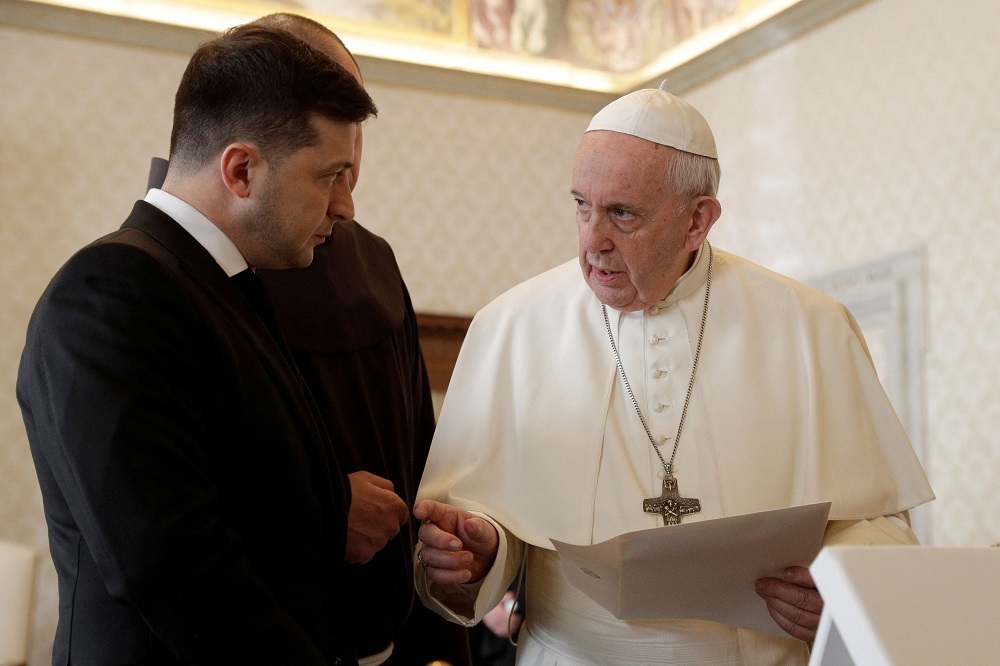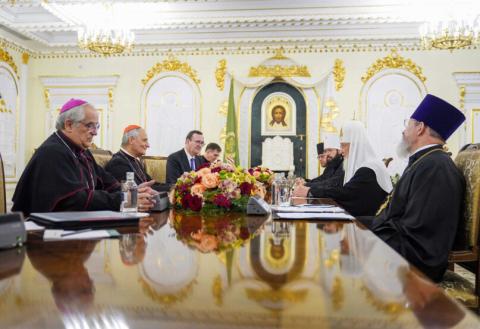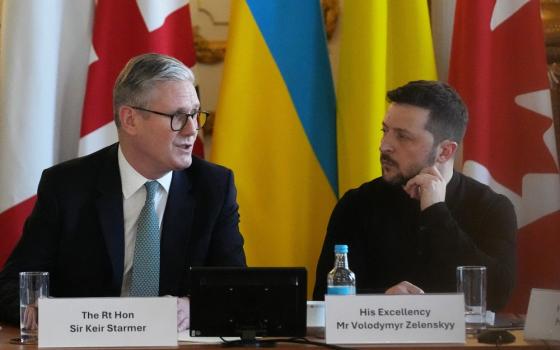
Ukrainian President Volodymyr Zelenskyy is pictured with Pope Francis during a private audience at the Vatican in this Feb. 8, 2020, file photo. (CNS/Gregorio Borgia, Reuters pool)
Following the Angelus, his weekly prayer service at the Vatican, on Sunday (Aug. 25), Pope Francis criticized Ukraine’s decision to ban the Ukrainian Orthodox Church, which has historically been tied to Russia, saying that Christians should be allowed to pray freely and that churches should not be abolished.
"In thinking about the laws recently adopted in Ukraine, I fear for the freedom of those who pray, because those who truly pray always pray for all," Francis said after the prayer service.
The pope stated that "a person does not commit evil by praying" and urged Ukrainian leaders to "let those who want to pray be allowed to pray in what they consider their Church."
"Please, let no Christian church be abolished directly or indirectly. Churches are not to be touched!" he said.

Russian Orthodox clergy and Patriarch Kirill, right side of table, meet with Cardinal Matteo Zuppi and Roman Catholic delegates at the Patriarchal Residence in Danilov Monastery, in Moscow, Russia, Thursday, June 29, 2023. (Moscow Patriarchate)
A day earlier, on Ukraine’s Independence Day, Ukrainian President Volodymyr Zelenskyy signed into law a long-debated bill outlawing churches affiliated with the Russian Orthodox Church, including the Ukrainian Orthodox Church. While the UOC has denied having any ties to the Moscow patriarchate since the beginning of the war between Russia and Ukraine, the church has been suspected of promoting Russian propaganda.
Ukraine’s security service has accused the UOC of acting as a platform to justify the Russian invasion of Ukraine and says its churches are havens for spies. The organization has launched criminal proceedings against at least 100 UOC clergy members, with 26 already sentenced.
A study conducted in April by the Kyiv International Institute of Sociology found that 83% of Ukrainians felt that the government should intervene in the activities of the UOC, while 63% supported banning the church altogether.
After some two years of discussion, Ukraine’s parliament overwhelmingly passed the law by a vote of 265-29 on Aug. 20. Religious groups with ties to Russia were allowed nine months to sever their relationship with Moscow or leave the country.
Francis and the Vatican have conducted multiple diplomatic missions to promote a peaceful resolution to the conflict. The church has made charitable contributions to the Ukrainian people while sending a papal envoy, Cardinal Matteo Zuppi, to negotiate prisoner exchanges and create humanitarian corridors for refugees.
The spokesman for the UOC, Metropolitan Klyment, told journalists after the bill was passed that the ban "will only discredit, including internationally, those who will try to do this," and compared the policy to the Soviet takeover of church properties in the last century.
The majority of Ukrainians are Orthodox Christians, but following Russia’s annexation of Crimea in 2014, Metropolitan Epiphanius I of Kyiv and All Ukraine led his loyalists to form a new denomination, the Orthodox Church of Ukraine. In 2019, the spiritual head of the global Orthodox Church, Patriarch Bartholomew I of Constantinople, officially recognized the independent church.
The split deepened the religious dimension of the conflict between Russia and Ukraine and gave Moscow Patriarch Kirill, an ally of Russian President Vladimir Putin, cause to defend Russia’s invasion, describing it as a holy war. In the territory that Russian forces occupy in eastern Ukraine, they have attempted to dismantle the Orthodox Church of Ukraine.
In a video meeting with Kirill in March of 2022, Francis made an appeal for peace while warning the patriarch not to be "Putin’s altar boy."
Advertisement
Francis and the Vatican have conducted multiple diplomatic missions to promote a peaceful resolution to the conflict. The church has made charitable contributions to the Ukrainian people while sending a papal envoy, Cardinal Matteo Zuppi, to negotiate prisoner exchanges and create humanitarian corridors for refugees.
The No. 2 official at the Vatican, Secretary of State Cardinal Pietro Parolin, traveled to Ukraine in July to meet with high-level officials and religious representatives. On July 22, he met with Viktor Yelensky, head of Ukraine’s agency for ethnic affairs and freedom of conscience, to discuss religious freedom issues.
With Zelenskyy’s signing of the ban on Russian-affiliated churches, these diplomatic entreaties seem to have failed, pointing up the challenge Francis’ peacemaking has faced since the war began. The Vatican’s determination to act as an impartial arbiter in the conflict with the hope of negotiating a peace between the warring sides has primarily caused backlash from Ukrainian leaders and citizens alike.
"I continue to follow with sorrow the fighting in Ukraine and the Russian Federation," the pope said on Sunday. "Let us continue to pray for an end to wars, in Palestine, in Israel, in Myanmar and in every other region. The people are asking for peace! Let us pray that the Lord will give us all peace."




